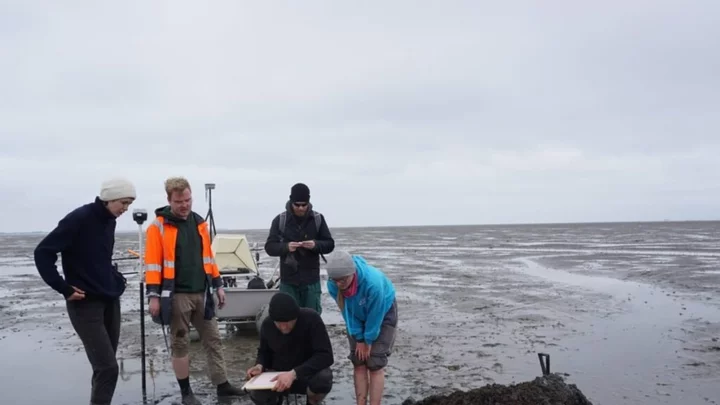
Asia Stocks Set for Cautious Open Before Debt Vote: Markets Wrap
Asian equities were poised for a cautious open Tuesday as White House and Republican congressional leaders stepped up
2023-05-30 07:29

Winklevoss Twins Attempt Pivot After Gemini Loses Money and Employees
Since going all-in on Bitcoin over a decade ago, Tyler and Cameron Winklevoss have had their share of
2023-05-30 07:25

Elizabeth Holmes is going to prison. Will she ever pay victims too?
Experts say victims often never get their money back from those who defrauded them.
2023-05-30 04:56

Musk expected to visit China this week, meet officials - sources
HONG KONG/SHANGHAI Tesla Chief Executive Elon Musk is expected to visit China this week, three people with knowledge
2023-05-29 20:24

Bitcoin Jumps to More Than Two-Week High on Relief Over US Debt Ceiling
Bitcoin climbed to the highest level in more than two weeks amid a boost to investor sentiment from
2023-05-29 15:57

PwC Australia Puts Nine Partners on Leave as Scandal Deepens
PwC Australia is putting nine senior partners on leave and appointing independent directors to its board as the
2023-05-29 12:21

Japan Calls on North Korea to Abandon ‘Satellite’ Launch
Japan called for North Korea to refrain from a planned rocket launch it described as a “serious provocation”
2023-05-29 10:27

US Stock Futures Rise, Dollar Subdued on Debt Deal: Markets Wrap
US stock futures advanced as appetite for risk taking returned to global markets following the deal between President
2023-05-29 07:26

Europe's 'City of Atlantis' discovered after being lost for 600 years
The remains of a church from a sunken town known as the 'Atlantis of the North Sea' has been discovered beneath the mud on Germany's coast. The church is believed to be part of a site called 'Rungholt' located in the Wadden Sea. The town, which was previously thought to be a local legend, has not been seen since 1362 after it was submerged beneath the waves during an intense storm. However, new research has shown that the town really did exist and that they had built reinforcements around the settlement to protect them from the severe elements. The research was carried out on the area by archeologists from Kiel University, Johannes Gutenberg University Mainz, the Center for Baltic and Scandinavian Archaeology, and the State Archaeology Department Schleswig-Holstein. Sign up to our free Indy100 weekly newsletter Searching the Wadden Sea which is the longest stretch of intertidal sand and mud flats on Earth, the team, using geophysical imaging technology found man-made mounds that had been constructed to protect the town against the tides. Amongst this structure were the foundations of a building which the team determined had to be a church which may have been the location of the town centre. In a statement, Dr. Dennis Wilken, a geophysicist at Kiel University of Kiel University said: "Settlement remains hidden under the mudflats are first localized and mapped over a wide area using various geophysical methods such as magnetic gradiometry, electromagnetic induction, and seismics." Dr. Hanna Hadler from the Institute of Geography at Mainz University added: "Based on this prospection, we selectively take sediment cores that not only allow us to make statements about spatial and temporal relationships of settlement structures, but also about landscape development." Dr. Ruth Blankenfeldt, an archaeologist at ZBSA also suggested that the "special feature of the find lies in the significance of the church as the centre of a settlement structure, which in its size must be interpreted as a parish with superordinate function." The storm that washed away Rungholt has gone down in history as one of the largest to ever hit the region, affecting not just Germany but also the Netherlands, Denmark and the UK. The storm happened on January 1362 and has since been referred to as "the great drowning of men." According to historical reports, Rungholt was once a busy trading port for fishermen but was also populated by taverns, brothels and churches. Have your say in our news democracy. Click the upvote icon at the top of the page to help raise this article through the indy100 rankings.
2023-05-28 19:27

Scientists might have discovered a simple way to stop the ageing process
The feeling of hunger could be a simple way to stop the ageing process, according to a new study. Researchers at the University of Michigan tricked fruit flies into feeling hungry which resulted in the insects living longer – even when they eat their calorie intake. The study - published in Science - suggests that the perception of insatiable hunger alone can generate the anti-aging effects of intermittent fasting. (And since it’s the perception rather than actual hunger, it means the bugs don’t actually have to starve). Sign up to our free Indy100 weekly newsletter "We've sort of divorced [the life extending effects of diet restriction] from all of the nutritional manipulations of the diet that researchers had worked on for many years to say they're not required," physiologist Scott Pletcher said, as per Michigan Medicine. "The perception of not enough food is sufficient." You may have heard the term intermittent fasting before, as it is a popular diet fad that consists of going for extended periods of time without eating, followed by a period of eating normally, according to Bupa. Despite its popularity, evidence supporting its benefits is limited in terms of research on humans. Perhaps you’re thinking… why fruit flies? Well, the insects actually share 75 percent of the same disease-related genes as us, while also sharing similar qualities to mammals in terms of their metabolisms and brains, according to Science Alert. In the research, branched-chain amino acids (BCAA) essential nutrients that appear to trigger feelings of fullness in flies when consumed, were used. The fruit flies maintained their hunger through getting fed snacks low in BCAA and their hunger was noticed through how much the insects ate from a buffet of food hours after eating the snack. More food was consumed by flies who earlier ate a low-BCAA snack, and they choose protein over carbs, focusing on what their hungry bodies needed. From learning this, the team directly activated the neurons in fruit flies that trigger hunger responses, they found these hunger-stimulated flies also lived longer. "Demonstration of the sufficiency of hunger to extend life span reveals that motivational states alone can be deterministic drivers of ageing," Pletcher and colleagues wrote in the findings. Along with fruit flies, rodents have also been part of the study and both seems to suggest calorie restriction can extend life and is good for our health too. Though of course, more extensive research is required to see whether or not this is also the case with humans. Have your say in our news democracy. Click the upvote icon at the top of the page to help raise this article through the indy100 rankings.
2023-05-28 01:27

Remains of the 'Atlantis of the North Sea' discovered in Germany
The remains of a church from a sunken town known as the 'Atlantis of the North Sea' has been discovered beneath the mud on Germany's coast. The church is believed to be part of a site called 'Rungholt' located in the Wadden Sea. The town, which was previously thought to be a local legend, has not been seen since 1362 after it was submerged beneath the waves during an intense storm. However, new research has shown that the town really did exist and that they had built reinforcements around the settlement to protect them from the severe elements. The research was carried out on the area by archeologists from Kiel University, Johannes Gutenberg University Mainz, the Center for Baltic and Scandinavian Archaeology, and the State Archaeology Department Schleswig-Holstein. Sign up to our free Indy100 weekly newsletter Searching the Wadden Sea which is the longest stretch of intertidal sand and mud flats on Earth, the team, using geophysical imaging technology found man-made mounds that had been constructed to protect the town against the tides. Amongst this structure were the foundations of a building which the team determined had to be a church which may have been the location of the town centre. In a statement, Dr. Dennis Wilken, a geophysicist at Kiel University of Kiel University said: "Settlement remains hidden under the mudflats are first localized and mapped over a wide area using various geophysical methods such as magnetic gradiometry, electromagnetic induction, and seismics." Dr. Hanna Hadler from the Institute of Geography at Mainz University added: "Based on this prospection, we selectively take sediment cores that not only allow us to make statements about spatial and temporal relationships of settlement structures, but also about landscape development." Dr. Ruth Blankenfeldt, an archaeologist at ZBSA also suggested that the "special feature of the find lies in the significance of the church as the centre of a settlement structure, which in its size must be interpreted as a parish with superordinate function." The storm that washed away Rungholt has gone down in history as one of the largest to ever hit the region, affecting not just Germany but also the Netherlands, Denmark and the UK. The storm happened on January 1362 and has since been referred to as "the great drowning of men." According to historical reports, Rungholt was once a busy trading port for fishermen but was also populated by taverns, brothels and churches. Have your say in our news democracy. Click the upvote icon at the top of the page to help raise this article through the indy100 rankings.
2023-05-27 22:54

As Elizabeth Holmes heads to prison for fraud, many puzzle over her motives
As Elizabeth Holmes prepares to report to prison next week, the criminal case that laid bare the blood-testing scam at the heart of her Theranos startup is entering its final phase
2023-05-27 22:17
